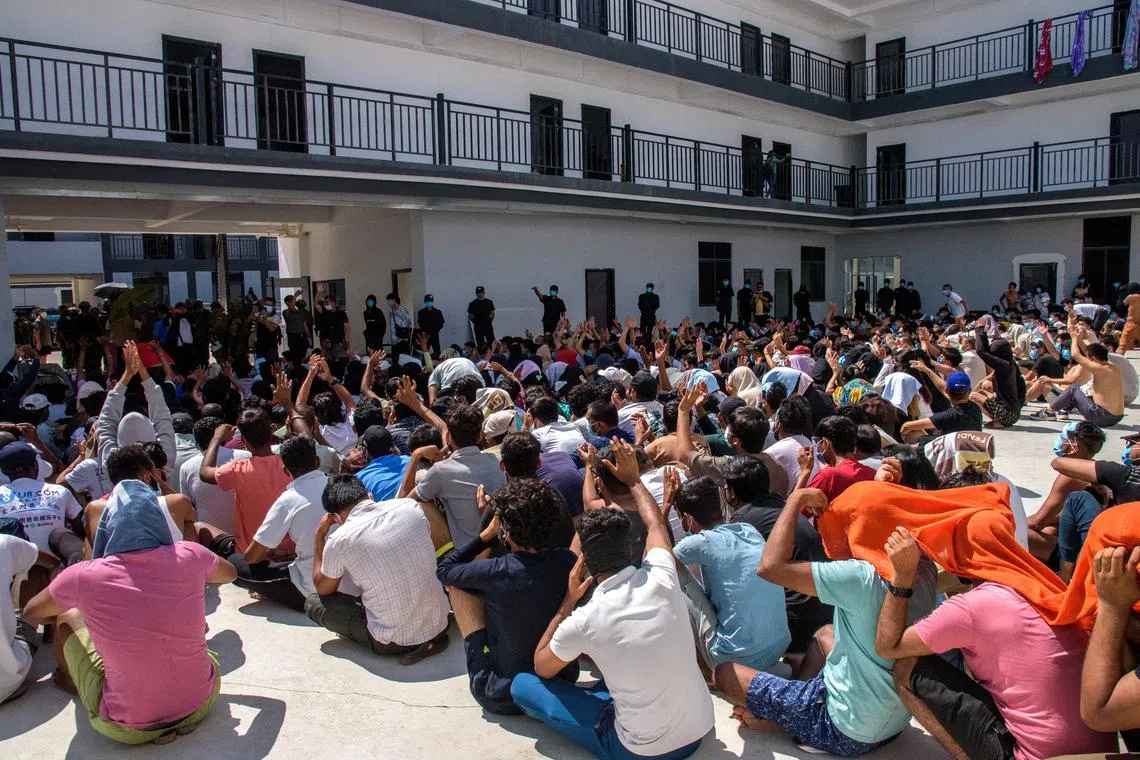‘Cancer’ of billion-dollar cyberscam industry spreading globally: UN
Sign up now: Get insights on Asia's fast-moving developments

Conservative estimates indicate there are hundreds of large-scale scam farms around the world generating tens of billions of dollars in annual profits.
PHOTO: REUTERS
Follow topic:
BANGKOK - Asian crime syndicates behind the multibillion-dollar cyberscam industry are expanding globally including to South America and Africa, as raids in South-east Asia fail to contain their activities, the UN said in a report on April 21.
Criminal networks that emerged in South-east Asia in recent years, opening sprawling compounds housing tens of thousands of workers, many trafficked and forced to scam victims around the world
Even as South-east Asian governments have intensified a crackdown, syndicates have moved within and beyond the region, the agency said, adding that a “potentially irreversible spillover has taken place... leaving criminal groups free to pick, choose and move... as needed”.
“It spreads like a cancer,” said UNODC’s regional analyst John Wojcik. “Authorities treat it in one area, but the roots never disappear; they simply migrate.”
Conservative estimates indicate there are hundreds of large-scale scam farms worldwide generating tens of billions of dollars in annual profits, the UNODC said.
It urged countries to work together and intensify efforts to disrupt the gangs' financing.
“The regional cyberfraud industry... has outpaced other transnational crimes, given that it is easily scalable and able to reach millions of potential victims online, with no need to move or traffic illicit goods across borders,” said Mr Wojcik.
The US alone reported more than US$5.6 billion (S$7.34 billion) in losses to crypto currency scams in 2023, including over US$4 million in so-called pig-butchering scams or romance scams designed to extort money from often elderly and vulnerable people.
In recent months, authorities from China, where many of the gangs originate, Thailand and Myanmar have led a crackdown on scam operations in lawless areas of the Thai-Myanmar border, with Thailand cutting power, fuel and internet supply
But syndicates have adapted, shifting operations between “the most remote, vulnerable, and underprepared parts of South-east Asia”, especially in Laos, Myanmar, and Cambodia, and beyond, exploiting jurisdictions with weak governance and high rates of corruption, the UNODC said.
Raids in parts of Cambodia where the industry is most visible “led to significant expansion in more remote locations”, including the country’s western Koh Kong province, as well as areas bordering Thailand and Vietnam, the UN agency said.
Cambodian government spokesman Pen Bona said the country is among the victims of the cyberfraud industry and is committed to fighting it.
The government recently established an ad-hoc commission chaired by Prime Minister Hun Manet to address the issue by strengthening law enforcement, developing a legislative framework and increasing collaboration with partner nations and the UN, he said.
To overcome the “complex problem, we need collaboration not blame”, he said.
A spokesperson for the Myanmar junta did not immediately respond to requests for comment.
Syndicates have expanded into South America, the UN agency said, seeking to enhance money laundering and underground banking partnerships with the region’s drug cartels. They are also establishing operations in Africa, including in Zambia, Angola, and Namibia, and in Eastern Europe including Georgia, the agency said.
Gangs have also rapidly diversified their workforce, recruiting people from dozens of nationalities, according to the agency, reflecting how the industry scams targets across the globe and has sought to evade anti-trafficking efforts.
Citizens of over 50 countries – from Brazil to Nigeria, Sri Lanka and Uzbekistan – were rescued during recent raids along the Thai-Myanmar border.
The international community is at a “critical inflection point”, the UNODC said, emphasising that failure to address the problem would have “unprecedented consequences for South-east Asia that reverberate globally”. REUTERS

